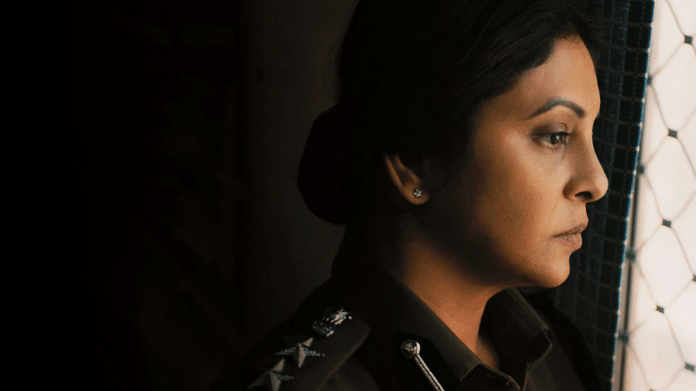The ‘Nirbhaya’ gangrape story has just broken out. The Delhi Police has been awake all night and protesters are gathering outside the police station. In sweatpants and a T-shirt, a tired but determined DCP Vartika Chaturvedi, played by Shefali Shah, looks at the protesters and realises time is running out. The scene almost evokes sympathy for the police. Netflix’s new seven-part thriller, Delhi Crime, releases today and tells the brutal story of the Jyoti Singh Pandey gangrape case all over again.
But why make a Netflix series on one of the most well-documented and reported crime stories in India? Because the vantage point is now the Delhi Police and that’s a lesser-known perspective, considering how much flak and criticism came their way in 2012 when the case unfolded.
Indo-Canadian director Richie Mehta dug up police files and notes to tell the story as a crime procedural. There are no gratuitous scenes of violence and rape, not even through acoustics. You don’t see the brutality, you don’t hear it because the police, too, didn’t. The first time the audience sees the insides of the bus, or the crime scene, is when the police see it for the first time as well. From the series’ perspective, that is refreshing because the story uncovers in front of you, and there aren’t too many narratives competing for your attention. It is perhaps this technique that holds your gaze.
Also read: Why the outcry over the 8-yr-old’s rape-murder is nowhere close to what we saw for Nirbhaya
Curiosity didn’t kill the cat
In 2012, the media latched onto every detail of the gangrape and its aftermath, no matter how brutal or banal. There were updates pouring in faster than one could keep up. Protests were breaking out and we were marching for justice every other day.
The media went into a frenzy. Some channels had actors play out the scene on loop, others had illustrations, graphics and animation. Others flashed gory details across the screen. Before the trials started of the accused men, TV trials had already declared their judgment and handed out sentences.
The media was just feeding the voyeurs in each of us. Which is why there have been numerous films on Jack the Ripper and Ted Bundy, and there will be many more.
But the novel thing about Delhi Crime is that it doesn’t pander — it is slow, meandering and is in no hurry to draw a conclusion. The camera seems to be just another cop in the dimly lit police station, also seeing what we see for the first time. At a special screening, director Mehta said that the entire series was shot on hand-held cameras, adding to the thrill of it. The camera sees the bus escape the cops, it sees DCP Vartika Chaturvedi’s anger as well as resolve after she visits the hospital for the first time, it sees newly-minted officer Neeti Singh (Rasika Dugal) struggle between duty and justice.
Also read: Indian media finally covered Pollachi gang rape – for people Googling ‘sex videos’
Shefali Shah does wonders with her character Vartika Chaturvedi. Her emotions simmer beneath her uniform and don’t colour her leadership — something women in all professions have been accused of. The ensemble cast holds together the tight storytelling and deftly handle their parts.
Anatomy of a murder
A good crime thriller is where the story or the ending is already known but the way it is re-told makes all the difference. When Meghna Gulzar’s Talvar released in 2015, it became a hit and renewed the call for justice for Aarushi Talwar. The film, much more gruesome and dramatised than Delhi Crime, played the murder scene on loop from different people’s perspectives. The audience can decide for themselves what they want to believe.
In Delhi Crime, we know the six men guilty will be caught, and yet you look forward to the next episode to understand how they were caught and what happened before they were caught. The draw of the show isn’t the ending, that is known; it is the calibrated reverse gear that the creators pull.
One track horse
Delhi Crime is not a bland visualisation of a police tale, it also gives them backstories, shows how there can never be preventive policing in a populous city like Delhi because the police staff are overworked, underpaid and small in number. It humanises a much-critiqued institution.
Also read: Respected judges & ministers, policing Netflix won’t make us sanskari
For instance, DCP Chaturvedi’s daughter wants to leave India and study abroad because she says the country is unsafe — even before the gangrape has been reported. When Chaturvedi finds out about the case, one of her first thoughts is to shield her daughter from it, to the extent of keeping her away from the papers and TV. However, in a nice touch, the daughter is shown as one of the hesitant protesters outside the police station when Chaturvedi briefs the media.
However, in its effort to humanise and take only one perspective, Delhi Crime seems to overlook much. The police and the special investigations team appear without fault, at least in the first few episodes. The delays, mistakes in investigation and lapses are given a free pass and sometimes justifications. And any crime thriller urges the question: Are we being told the truth or is there too much creative licence being taken?
We will only find out when we are done binge-watching Delhi Crime on Netflix.






